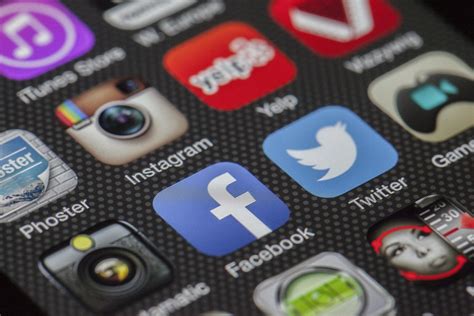Social Media Does More Harm Than Good

Social media has become an integral part of our daily lives, with billions of people worldwide actively engaging with various platforms. From connecting with friends and family to accessing news and entertainment, social media offers a plethora of opportunities. However, the impact of social media on individuals and society as a whole is a topic of intense debate. While it undoubtedly brings many benefits, an increasing body of evidence suggests that social media may cause more harm than good.
In this comprehensive analysis, we delve into the complex world of social media, exploring its effects on mental health, privacy, misinformation, and societal divisions. By examining real-world examples, scientific studies, and industry insights, we aim to provide a nuanced understanding of social media's impact and offer valuable insights for users and policymakers alike.
The Dark Side of Social Media: Unraveling the Negative Impacts

Despite its potential for connection and community building, social media has been linked to a range of adverse effects on individuals and society.
Mental Health Concerns
One of the most pressing concerns surrounding social media is its impact on mental health. Numerous studies have highlighted the correlation between excessive social media use and increased rates of anxiety, depression, and loneliness.
For instance, a longitudinal study published in the Journal of Social and Clinical Psychology found that reducing social media usage led to significant improvements in well-being and reduced symptoms of depression and loneliness among young adults. The study participants reported feeling less socially isolated and more satisfied with their lives after cutting down on social media.
Additionally, the constant comparison to carefully curated online personas can lead to negative self-perception and low self-esteem. A study by the American Psychological Association revealed that social media users often experience feelings of envy and inadequacy when comparing their lives to the seemingly perfect lives portrayed by others online.
Privacy and Data Security
Social media platforms collect vast amounts of personal data, raising serious concerns about privacy and data security.
In 2018, the Cambridge Analytica scandal revealed how personal data from millions of Facebook users was harvested and used for political advertising. This incident sparked a global debate on data privacy and the ethical use of user information.
Furthermore, the frequent data breaches experienced by social media companies highlight the vulnerability of user data. A report by the Privacy Rights Clearinghouse revealed that there have been over 200 major data breaches involving social media platforms since 2005, compromising the personal information of millions of users.
Misinformation and Fake News
The spread of misinformation and fake news on social media has become a significant challenge in recent years. The viral nature of social media platforms allows false information to reach vast audiences rapidly.
A study by Nature Communications analyzed the spread of true and false news stories on Twitter and found that false news stories spread significantly faster and reached more people than true stories. This phenomenon has real-world consequences, as misinformation can influence public opinion, political decisions, and even trigger social unrest.
Divisive Content and Polarization
Social media algorithms often prioritize engaging and controversial content, leading to the proliferation of divisive and polarizing narratives.
A report by the Pew Research Center found that social media users often encounter content that reinforces their existing beliefs and biases. This echo chamber effect can exacerbate political and social divisions, making it challenging for individuals to engage in meaningful dialogue and understand differing viewpoints.
The Positive Impact of Social Media: A Balanced Perspective

While the negative impacts of social media are undeniable, it is essential to acknowledge its positive contributions as well. Social media has the potential to bring people together, foster community, and facilitate meaningful connections.
Community Building and Support
Social media platforms provide a space for individuals with shared interests, passions, and identities to connect and form communities. These online communities can offer valuable support, especially for marginalized or underrepresented groups.
For example, the LGBTQ+ community has found a safe space on social media platforms to connect, share experiences, and access vital resources. Similarly, social media has been instrumental in raising awareness and funds for various social causes, such as the #MeToo movement and environmental initiatives.
Access to Information and Education
Social media has revolutionized the way information is accessed and shared. It provides a platform for diverse voices and perspectives, allowing users to engage with a wide range of content and experts.
Many educational institutions and organizations utilize social media to reach a broader audience and provide valuable resources. For instance, the Khan Academy YouTube channel offers free educational videos on various subjects, benefiting millions of learners worldwide.
Business and Economic Opportunities
Social media has opened up new avenues for businesses and entrepreneurs, offering cost-effective marketing and advertising solutions. Small businesses, in particular, have found social media platforms to be powerful tools for reaching potential customers and building brand awareness.
Additionally, social media influencers and content creators have emerged as a new breed of entrepreneurs, leveraging their online presence to build successful careers and businesses.
Regulating Social Media: A Call for Action
As the negative impacts of social media become increasingly apparent, the need for effective regulation and oversight has gained momentum.
Data Privacy and User Protection
Stricter data privacy regulations, such as the General Data Protection Regulation (GDPR) in Europe, aim to give users more control over their personal information. Social media platforms must obtain explicit consent from users before collecting and processing their data.
Furthermore, implementing robust data security measures and regularly auditing third-party data access can help mitigate the risk of data breaches and protect user privacy.
Combating Misinformation
Social media platforms have a responsibility to combat the spread of misinformation and fake news. Fact-checking initiatives, improved content moderation, and user education can help mitigate the impact of false information.
For instance, Twitter recently introduced a label system to identify and flag tweets containing misleading information. This approach aims to provide users with context and help them make informed decisions about the content they engage with.
Promoting Digital Wellbeing
Social media companies should prioritize user wellbeing by offering tools and features that promote healthy usage habits. This can include features like usage tracking, time limits, and content filtering options.
Additionally, educating users about the potential risks and benefits of social media usage can empower them to make informed choices and take control of their online experiences.
Conclusion: Navigating the Social Media Landscape
Social media has undoubtedly transformed the way we connect, communicate, and access information. While it offers numerous benefits, the negative impacts on mental health, privacy, misinformation, and societal divisions cannot be ignored.
By understanding the complexities of social media and its effects, individuals can make more informed choices about their online presence and engagement. Similarly, policymakers and social media companies must work together to implement effective regulations and initiatives that prioritize user wellbeing and protect against potential harms.
As we navigate the ever-evolving social media landscape, striking a balance between harnessing its benefits and mitigating its negative impacts is crucial. Only then can we ensure a healthy and positive online environment for all.
How can individuals protect their privacy on social media platforms?
+
Individuals can take several steps to protect their privacy on social media. Firstly, review and adjust privacy settings to control the visibility of personal information. Secondly, be cautious about the personal details shared online and avoid oversharing. Additionally, regularly audit and delete outdated or unnecessary social media accounts.
What are some strategies to combat social media addiction and excessive usage?
+
To combat social media addiction, individuals can set time limits and usage goals, utilizing features like screen time tracking. It’s also beneficial to engage in offline activities and hobbies to reduce reliance on social media for entertainment or validation. Finally, seeking support from friends, family, or professionals can provide valuable guidance and motivation.
How can social media platforms improve content moderation and reduce misinformation?
+
Social media platforms can enhance content moderation by investing in advanced machine learning algorithms and expanding human moderation teams. Fact-checking partnerships with reputable organizations can also help identify and flag misleading content. Additionally, promoting media literacy and critical thinking skills among users can empower them to identify and reject false information.



